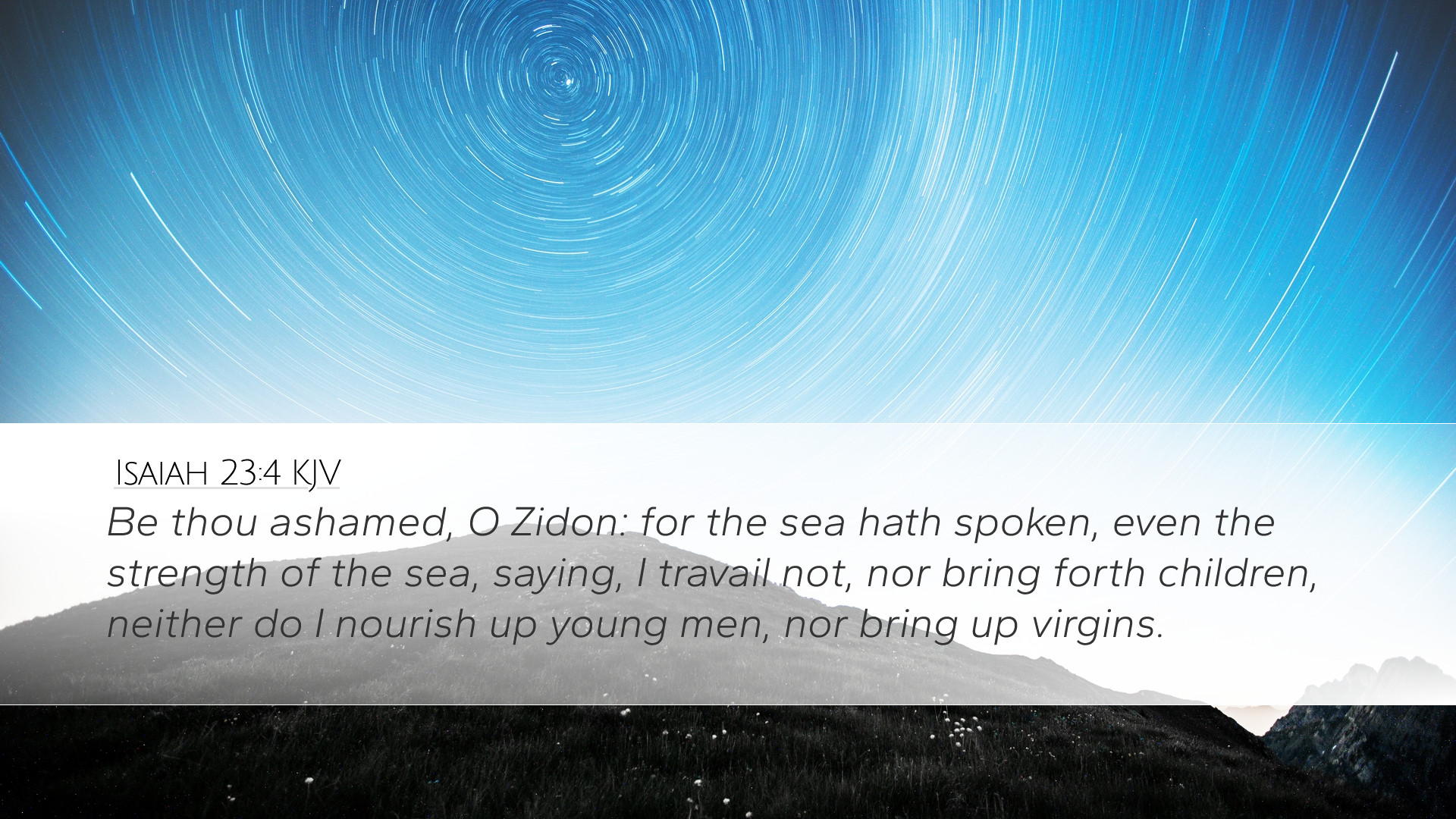Commentary on Isaiah 23:4
Verse: Isaiah 23:4 - "Be thou ashamed, O Sidon; for the sea hath spoken, even the strength of the sea, saying, I travail not, nor bring forth children; neither do I nourish up young men, nor bring up virgins."
Overview
This verse presents a profound message of judgment against Sidon, a prominent Phoenician city known for its maritime prowess and trade. The imagery of the sea speaks to the lifeblood of Sidon, its economic strength heavily reliant on commerce and shipping.
Contextual Background
Isaiah prophesied during a time of political turmoil and territorial strife, particularly regarding the nations surrounding Israel and Judah. Sidon, as part of Phoenicia, was not only a commercial hub but also a locus of idolatry and moral corruption. The prophetic message addresses not just a physical calamity but a spiritual indictment on the practices that flourished in Sidon.
- Historical Significance: Sidon was one of the oldest cities in the world, renowned for its wealth and seafaring ability.
- Political Dynamics: The relationship between Israel and surrounding nations was complex, with alliances often formed through trade, which made the fall of Sidon significant for the region.
Significance of the Sea Imagery
The reference to the sea emphasizes both abundance and desolation. The "strength of the sea" conveys the power that Sidon once derived from maritime activities. However, the image of travailing and not bringing forth children suggests a cessation of vitality and prosperity.
- Life-Giving Force: The sea, often viewed as a source of life, now becomes an indicator of barrenness.
- Cultural Interpretation: In ancient Near Eastern cultures, the sea represented chaos and divine judgment, and the yielding of its bounty symbolized divine favor.
Theological Implications
This verse carries significant theological weight, reflecting God's sovereignty over nations and their fates. The prophetic declaration serves as a reminder that the Lord judges the nations, and their economic and social structures are not immune to His scrutiny.
- Divine Judgment: The shame of Sidon signifies divine judgement, indicating that the nation's sins have led to a withdrawal of blessings.
- Message for God’s People: The admonition to Sidon serves as a warning to Israel as well; complacency in idolatry and sin invites judgment.
Commentary Insights
Matthew Henry
Matthew Henry emphasizes the shame that is inescapable for Sidon due to its transgressions. He notes that the people are addressed directly, highlighting the personal nature of divine accusation. Henry explains that the pride of Sidon in its strength is met with the impartial judgment of God, leading to a loss of its once-great identity.
Albert Barnes
Albert Barnes articulates that the “strength of the sea” represents the economic engine of Sidon. He interprets this imagery as a lament over its desolation, where the sea ironically does not bring forth the expected blessings but instead reveals emptiness. Barnes underscores the unfulfilled potential of Sidon, reflecting on the broader theme of divine retribution against arrogance and idolatry.
Adam Clarke
Adam Clarke sees this verse as a harsh signal of warning directed towards Sidon about its impending doom. He outlines that the phrase “I travail not” enunciates the barrenness that will affect the city, suggesting a complete desolation of its people and heritage. Clarke expounds on the broader repercussions for Phoenicia and the surrounding regions, warning of an economic collapse stemming from moral decay.
Lessons for Today
Isaiah 23:4 serves as a timeless reminder of the perils of straying from God's commands. Modern readers and leaders are encouraged to reflect on the foundation of their societal values and the consequences of neglecting moral accountability.
- Relying on God: Societies heavily reliant on material wealth and external strengths should recognize the fragility of such foundations without spiritual integrity.
- Awareness of Consequences: Just as Sidon faced the consequences of its transgressions, individuals and nations must remain vigilant of the moral implications of their actions.
Conclusion
Isaiah 23:4 encapsulates a profound warning not only for the ancient city of Sidon but for all followers of God. The imagery of the sea and its lament provides a powerful lamentation for lost potential and divine judgment, urging contemporary believers to seek alignment with God's will lest they share a similar fate.


